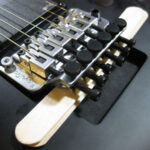Each composition on the album is meticulously crafted, drawing inspiration from a wide range of sources. “The Heart Sutra,” the opening track, is a somber yet captivating recitation of the ancient Buddhist text “Sutra of the Heart of Transcendent Wisdom.” Alcorn translates this profound message into a musical monotone, punctuated by minor thirds to signify the Buddha’s name and octaves to emphasize key philosophical points. This minimalist approach highlights the subtle nuances of the pedal guitar, drawing attention to the rich overtones and the delicate interplay of vibrations produced by single unison notes. It’s a piece that invites contemplation, using the pedal guitar to create a sonic space for reflection on the core Buddhist concept of “Form is Emptiness.”
“And I Await the Resurrection of the Pedal Steel Guitar” is perhaps the most overtly personal track on the album. Inspired by Olivier Messiaen’s monumental “Et Exspecto Ressurectionem Mortuorum,” Alcorn’s piece is both an homage and a statement of hope. She recounts the overwhelming experience of first hearing Messiaen’s work and draws a parallel to her own instrument, the pedal steel guitar. In this composition, Alcorn seeks to give voice to the instrument itself – its physical components, from the legs and pedals to the wood and strings. It’s a powerful expression of her belief in the pedal guitar’s enduring potential, a yearning for its resurgence in contemporary music with a majesty and beauty akin to Messiaen’s grand vision.
In contrast, “The Glass is Already Broken” is a more intimate piece, written to accompany the poem “Broken Glass” by Richard Todd. While the original text provides minimal detail about the musical content, the title itself suggests a fragility and perhaps a sense of melancholic beauty, qualities that the pedal guitar is uniquely capable of conveying.
“The First Turning of the Wheel” serves as an “open letter” to Bob Graettinger, the innovative composer and arranger known for his work with Stan Kenton. Alcorn’s piece evokes Graettinger’s stark and evocative soundscapes, reflecting themes of urban alienation and existential loneliness. The pedal guitar here becomes a voice in a silent conversation, a “soft hand on the shoulder,” attempting to express the inexpressible through music. “The Second Turning of the Wheel” continues this dialogue, offering a slightly altered perspective and emphasis, suggesting an ongoing exploration of similar emotional and musical terrain through the pedal guitar’s expressive voice.
Finally, “Three Minute Warning” reflects a contemporary sense of unease and uncertainty about the future. Despite the ominous title, Alcorn finds a glimmer of hope in music itself. She sees music as a “vast and limitless universe” of possibilities, existing within and between each note. The pedal guitar, in this context, becomes a vehicle for this hope, its sounds embodying a “primordial song of the heart,” a melody that resonates with a deep and perhaps forgotten sense of optimism.
Through “The Heart Sutra & The Second Turning of the Wheel,” Susan Alcorn masterfully showcases the pedal guitar not just as an instrument, but as a conduit for profound emotional and intellectual expression. The album invites listeners to reconsider the sonic possibilities of the pedal guitar and to appreciate its unique capacity to convey complex narratives and evoke deep feelings.

